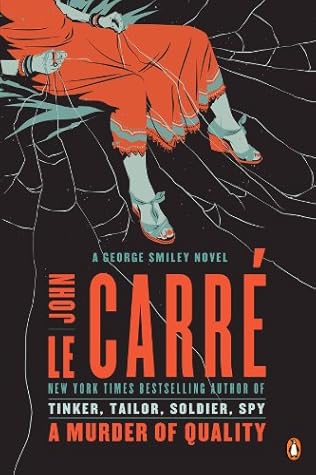More on this book
Community
Kindle Notes & Highlights
He walked to the pillar box at the corner of the road, posted his letter and wondered what to do about lunch. There were, of course, the sandwiches and coffee provided by Miss Brimley.
Reluctantly he returned to the hotel. It was full of journalists, and Smiley hated journalists. It was also cold, and he hated the cold. And there was something very familiar about sandwiches in a hotel bedroom.
Built in an age when cactus was the most fashionable of plants and bamboo its indispensable companion, the lounge was conceived as the architectural image of a jungle clearing.
sky. Enormous urns of bronze or green-glazed earthenware contained all that was elegant and prolific in the cactus world, and between them very old residents could relax on sofas of spindly bamboo, sipping warm coffee and re-living the discomforts of safari.
Smiley’s efforts to obtain a bottle of whisky and a syphon of soda at half past eleven at night were not immediately rewarded.
Somehow Mundy managed to imply that the Black Death was a fairly recent disaster in those parts, if not actually within living memory.
As Smiley watched him turn into the centre aisle and take his place among the principal mourners, it occurred to him that Rode’s very walk and bearing successfully conveyed something entirely alien to Carne.
If it is vulgar to wear a pen in the breast pocket of your jacket, to favour Fair Isle pullovers and brown ties, to bob a little and turn your feet out as you walk, then Rode beyond a shadow of doubt was vulgar, for though he did not now commit these sins, his manner implied them all.
D’Arcy wouldn’t have liked the way he said that; cocksure lad on a motor-bike. Pencils in the outside pocket.
Obscurity was his nature, as well as his profession. The byways of espionage are not populated by the brash and colourful adventurers of fiction. A man who, like Smiley, has lived and worked for years among his country’s enemies learns only one prayer: that he may never, never be noticed. Assimilation is his highest aim, he learns to love the crowds who pass him in the street without a glance; he clings to them for his anonymity and his safety. His fear makes him servile—he could embrace the shoppers who jostle him in their impatience, and force him from the pavement. He could adore the
...more
But this fear, this servility, this dependence, had developed in Smiley a perception for the colour of human beings: a swift, feminine sensitivity to their characters and motives. He knew mankind as a huntsman knows his cover, as a fox the wood. For a spy must hunt while he is hunted, and the crowd is his estate. He could collect their gestures and their words, record the interplay of glance and movement, as a huntsman can record the twisted bracken and the broken twig, or as a fox detects the signs of danger.
“Terence is wicked, isn’t he? Charles loathes him. I’m afraid they see Sparta in quite different ways…Poor Terence. It’s his last Half, you know.”
“That’s the trouble today. Like Africa. Nobody seems to understand you can’t build society overnight. It takes centuries to make a gentleman.”
“These bloody journalists ought to be horsewhipped!” he declared. “Look at the stuff they print about the Royal Family. Wicked, wicked!”
Smiley was reminded of Büchner’s fairy tale of the child left alone in an empty world who, finding no one to talk to, went to the moon because it smiled at him, but the moon was made of rotten wood. And when the sun and moon and stars had all turned to nothing, he tried to go back to the earth, but it had gone.
Bridge was as preposterous as ever; bony steel, rising to Wagnerian pinnacles, against the patient London sky; the Thames crawling beneath it with resignation, edging its filth into the wharves of Battersea, then sliding towards the mist down river.
“That is the peace I mean. Not to exist in anyone’s mind, but my own; to be a secular monk, safe and forgotten.”
“You know, Fielding,” he said at last, “we just don’t know what people are like, we can never tell; there isn’t any truth about human beings, no formula that meets each one of us. And there are some of us—aren’t there?—who are nothing, who are so labile that we astound ourselves; we’re the chameleons. I read a story once about a poet who bathed himself in cold fountains so that he could recognise his own existence in the contrast. He had to reassure himself, you see, like a child being hateful to its parents. You might say he had to make the sun shine on him so that he could see his shadow and
...more
“Stop him, stop him, Smiley, for God’s sake! They’ll hang me.” And he shouted the last two words again and again: “Hang me, hang me,” until the detectives came in from the street and shoved him without ceremony into a waiting car.
Smiley watched the car go. It didn’t hurry, just picked its way down the wet street and disappeared. He remained there long after it had gone, looking towards the end of the road, so that passers-by stared oddly at him, or tried to follow his gaze. But there was nothing to see. Only the half-lit street, and the shadows moving along it.


